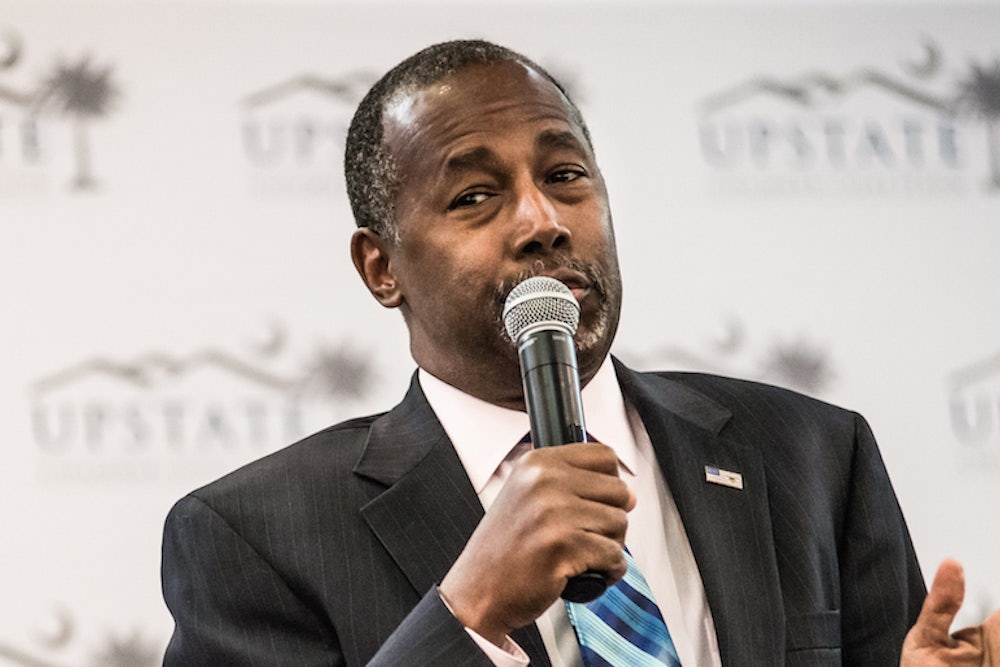Ben Carson is under fire for his callous comment on Fox News on Tuesday that, if he were in a situation like the mass shooting at Umpqua Community College in Oregon, "I would not just stand there and let him shoot me. I would say, 'Hey guys, everybody attack him. He may shoot me, but he can’t get us all.'"
"Well, actually"-ing victims of a mass murderer is always a good look. http://www.huffingtonpost.com/entry/ben-carson-oregon-shooting_5613d305e4b0baa355ad32d6?utm_hp_ref=politics ...
—
jesseltaylor
I am hereby calling for schools to put a Ben Carson in every classroom to prevent future shootings http://www.huffingtonpost.com/entry/ben-carson-oregon-shooting_5613d305e4b0baa355ad32d6 ... (via @aterkel)
—
nickpwing
Carson seems convinced that he'd act heroically in the face of danger, but the Republican presidential candidate shouldn't be so sure of himself, says Dr. Nick Ladany, dean of the School of Leadership and Education Sciences at University of San Diego and a former psychology professor.
“It strikes me as a very simpleminded approach to how someone would respond to a crisis,” Ladany told me. “We can fantasize all we want about how we might react, but until you’re in the situation you really don’t know.”
Ladany said Carson’s comments ignore the intricacies of split-second decisions required in an emergency. Most people don’t instinctively confront a threat, because doing so puts their lives in greater danger; the human instinct for self-preservation instead causes people to run—if they don’t first experience what Ladany describes as a paralysis in decision-making—or hide.
Franci Crepeau-Hobson, a psychology professor at the University of Colorado Denver, says a complex set of traits determines how someone reacts to a crisis, and it's nearly impossible to tell what that reaction will be.
"When you are in a life or death situation, sometimes you're autonomic nervous system takes over and you may not behave the way you thought you would," she said. "There are some factors that might make someone more likely to freeze versus run versus perhaps fight back, but it's not a real straightforward generalization that you can make."
Moreover, running and hiding are exactly what people in danger should do, according to experts in active shooter situations.
A Department of Homeland Security handbook advises civilians to “quickly determine the most reasonable way to protect your own life.” DHS’s recommendations, echoed by law enforcement experts across the country, are as follows:
1. Run
2. Hide
3. Fight
If you can run, you should—and even leave others behind if they won’t follow you. If you cannot escape, hiding is the next best option. Fighting an assailant is only a “last resort” that requires “committing to your actions," says DHS.
Most people don't have the wherewithal to know precisely what to do during a moment of crisis. That knowledge usually comes from extensive training in how to respond to particular situations. Just as EMTs are more likely to know what to do when they see a car accident, people with military or police experience are more likely to know what to do when faced with a gunman. Crepeau-Hobson said preparedness or military training can lead to a feeling of empowerment to fight back. "They've been trained on how to survive and what to do in those high-stress situations," she said. "That training just takes over."
Perhaps it is no coincidence, then, that in the Roseburg, Oregon shooting, the man who confronted gunman Chris Harper-Mercer was an Army veteran: Chris Mintz reportedly was in the classroom next to Room 15, where the shooting began and most of the carnage occurred. He fled to the adjacent building, the library, where he pulled a fire alarm and alerted students to flee. Then he returned to Snyder Hall and tried to block the shooter from entering another classroom. The New York Times reports:
The gunman shot him repeatedly through the doorway, then pushed through. Mr. Mintz, on the floor, told his attacker that it was his son’s sixth birthday, and was shot again before the gunman moved on. Mr. Mintz is expected to recover from his wounds.
Similarly, two of the three Americans who confronted a gunman on a Paris-bound train in August had military training: National Guardsman Aleksander Skarlatos and Air Force airman Spencer Stone.
All of these men rightly have been praised for their heroism, but their actions are contradictory to ingrained psychological responses. Their training taught them how to override human instinct—which means, in a way, that heroism is teachable. But “even then, if you’re trained," Ladany says, "you’re usually not trained for that type of situation.”
It's worth noting that Ben Carson, although reportedly a "superstar cadet" in high school ROTC, has no military experience. So if you happen to suffer an aneurysm, the former neurosurgeon might be of some use. But in an active shooter situation, Carson likely would be just as helpless as every untrained citizen.
